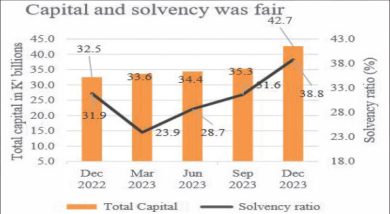Chuka speaks on bank challenges
 Reserve Bank of Malawi (RBM) Governor Charles Chuka has said the central bank is committed to normalising the current liquidity challenges facing some distressed commercial banks.
Reserve Bank of Malawi (RBM) Governor Charles Chuka has said the central bank is committed to normalising the current liquidity challenges facing some distressed commercial banks.
Chuka has also said the central bank is currently sending signals to the entire private sector in Malawi aimed at making money available to the private sector.
The governor said this at a news conference on the Malawi Growth and Development Strategy II (MGDS II) and the Malawi Economic Recovery Plan (Merp) in Lilongwe on Friday in reaction to Business News question on RBM’s assessment of liquidity position among Malawi commercial banks most of whom have been forced to resort to borrowing from the central bank at a non-collateralised discount window to patch up their balance sheet.
Open borrowing window
Chuka was accompanied by Finance Minister Dr. Ken Lipenga and Economic Planning and Development Minister Atupele Muluzi.
“As of now most of the banks are out of the window and I am happy that the banking system is coming back to normal,†said Chuka.
His statement comes on the back of a condemnation by money market analysts who alleged that the central bank was cashing in on the liquidity hiccups among local banks by charging them ‘punitive’ borrowing rates.
On June 1 2012, the RBM introduced a non-collateralised discount borrowing window at 18.5 percent some few weeks after it raised the bank rate—the rate at which commercial banks borrow from central bank—to 16 percent from 13 percent.
The move was to enable ‘stressed’ commercial banks access liquidity without collateral to avert a possible bank failure.
And when the RBM raised the bank rate again in July, it also raised the non-collateralised discount window to 23.5 percent. The facility expired on July 31 2012.
But Chuka announced then that its continuance, if still considered needed, will attract a charge of four percentage points above the bank’s prime lending rates or base plus four.
The base plus four was discontinued on September 4 2012 and the RBM reverted to the bank rate plus 2.5 percent or 23.5 percent.
Chuka said at a time when Malawi had little foreign currency, most banks were holding on to cash from importers who were in dire need of foreign currency, but after the devaluation of the kwacha in May most banks saw “a simple mismatch in their balance sheet.â€
The governor, who dispelled claims that RBM has been offering local banks ‘bail-out’ package through its non-collateralised discount borrowing window, said Malawi banks have enough capital and are solvent.
Optimism
Chuka also pleaded with Malawians to be patient in the wake of RBM’s continued implementation of its monetary policy, arguing that “actions take time to get effect.â€
Commenting on prevailing high interest rate being charged by most banks after the central bank had raised the base rate from 16 percent to 21 percent, Chuka partly attributed the situation on the reduction of money supply growth which, he said, has declined from 30 percent to 20 percent.
“I look at next year with optimism. Yes, we are talking of high interest rates now, but we will bring interest rates and inflation to lower levels not today,†he said.
Chuka also stated that the current high year-on-year inflation rate, currently at 25.5 percent as of August, has taken into account fuel price, new electricity and water tariffs and other adjustments. He re-affirmed RBM’s commitment to contain the rate to lower levels.
Dr. Lipenga said his ministry is working closely with the central bank to ensure ‘staying on course’ and avoid a mismatch between monetary and fiscal policy implementation.
He also said government understands the need to bring down inflation and interest rates as well as improving liquidity levels in the economy.




